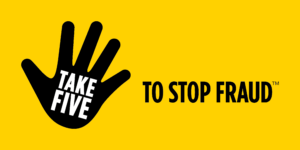Fraud Alert for TSB Customers
Action Fraud have issued two fraud alerts regarding customers of TSB.
The first warns of an increased risk of phishing attacks following the problems recently experienced by TSB.
The second warns of an increase in the number of “port out” fraud cases reported by TSB customers. Fraudsters are number porting a victim’s telephone number to a SIM card under their control and then using the number to access the victim’s bank accounts.
Protect Yourself
Whilst the advice given by Action Fraud is particularly relevant to TSB customers at this time, it should be followed by everybody:
-
Don’t assume an email or text is authentic:
Always question uninvited approaches in case it’s a scam. Phone numbers and email addresses can be spoofed, so always contact the company directly via a known email or phone number (such as the one on the back of your bank card).
-
Clicking on links/files
Don’t be tricked into giving a fraudster access to your personal or financial details. Never automatically click on a link in an unexpected text or email. Remember, a genuine bank will never contact you out of the blue to ask for your full PIN or password.
-
If you have received a suspicious TSB email,
please do not respond to it, report it to Action Fraud www.actionfraud.police.uk/report_phishing and also forward it to emailscams@tsb.co.uk
-
PAC Code notifications
If you receive an unsolicited notification about a PAC Code request, contact your network provider immediately to terminate the request. Also notify your bank about your phone number being compromised.
-
Requests to move money:
A genuine bank or organisation will never contact you out of the blue to ask for your PIN, full password or to move money to another account.
-
Every Report Matters.
If you have been a victim of fraud or cyber crime, report it to us online or by calling 0300 123 2040.
-
Visit Take Five and Cyber Aware
for more information about how to protect yourself online.
https://takefive-stopfraud.org.uk/
https://www.cyberaware.gov.uk/




 Kent County Council have issued two alerts of fraudulent activity:
Kent County Council have issued two alerts of fraudulent activity: Get Safe Online are warning of emails, texts and posts claiming to be from
Get Safe Online are warning of emails, texts and posts claiming to be from  The Kent and Medway Fire and Rescue Authority (KMFRA) met on 13 February and agreed the Council Tax for the Authority for 2018/19.
The Kent and Medway Fire and Rescue Authority (KMFRA) met on 13 February and agreed the Council Tax for the Authority for 2018/19. Requests to move money: A genuine bank or organisation will never contact you out of the blue to ask for your PIN, full password or to move money to another account. Only give out your personal or financial details to use a service that you have given your consent to, that you trust and that you are expecting to be contacted by.
Requests to move money: A genuine bank or organisation will never contact you out of the blue to ask for your PIN, full password or to move money to another account. Only give out your personal or financial details to use a service that you have given your consent to, that you trust and that you are expecting to be contacted by.